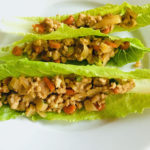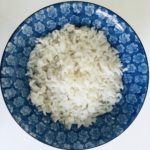Glucose syrup is a liquid sweetener used in candy, desserts and that ice cream in the picture. It can made from any starch. In the United States, corn is used, but in Europe it is usually derived from wheat. One would assume that the wheat-based glucose contains gluten, but in fact, glucose syrup made from wheat starch is considered gluten-free.
I confirmed this with Shelley Case, the go-to gluten-free dietician and author of Gluten Free Diet: A Comprehensive Resource Guide. In an email to me she said:
Glucose syrup can be derived from a variety of starches including wheat. Corn is the most common however Europe uses wheat more frequently. The glucose syrups are highly processed and purified and R5 elisa tests have found the majority to contain very little residual gluten if any. The European Food Safety put out a report on the safety of glucose syrups. Here is the link for more info:
Based on the FDA proposed gluten-free labeling regulation a product can be derived from a gluten-containing grain such as wheat based glucose syrup and be labeled gluten-free yet the ingredients could say glucose syrup (wheat) provided it is under 20 parts per million (ppm). This will be very confusing for patients as we teach them to avoid wheat and yet a product like glucose syrup may have no or very little residual gluten and be labeled gluten free.”
And just this month, a new gluten-free study from Finland was released. In the study they determined that it was safe for celiac patients to consume glucose syrup and other starch hydrolysates derived from wheat. Here is the summary of the report:
Background: Wheat-based starch hydrolysates such as glucose syrups, dextrose and maltodextrins are found in more than 50% of European processed food. These products contain low amounts of residual gluten, and it has been questioned whether they are safe for coeliac disease patients.
Aim: Our aim was to investigate whether coeliac disease patients can safely consume wheat-based starch hydrolysate products.
Methods: This randomized, double-blind, placebo-controlled, prospective follow-up study involved 90 coeliac disease patients in remission randomized to consume glucose syrups, maltodextrins or placebo for 24 weeks. Small bowel mucosal morphology and inflammation, symptoms, coeliac serology and malabsorption laboratory data were evaluated at baseline and at the end of the study.
Results: Daily ingestion of wheat-based starch hydrolysates, glucose syrups and maltodextrins, had no deleterious effect on small-bowel mucosal villous architecture or inflammation in coeliac disease patients when compared to the placebo group. Neither were there any significant differences in gastrointestinal symptoms, serology or malabsorption parameters after 24 weeks.
Conclusions: Wheat-based starch hydrolysates, glucose syrups and maltodextrins did not have harmful effect on coeliac disease patients. Coeliac patients can thus safely continue to consume these products.








dana says
I’d heard this information before, but I’m glad I happened upon your website so now I have it offically and in print. Thanks!
– Dana
deni says
I get leary of comments like
“The glucose syrups are highly processed and purified and R5 elisa tests have found the majority to contain very little residual gluten if any.”
The majority of? What about those few that DO contain residual gluten. Some of us are extremely sensitive to gluten and react to what others do not react to. Did they have extreme reactors in their study? You can only generalize your results to the population you took your sample from. So, if their pool had no extreme reactors and did not use any of the minority foods – this article gives a false sense of security.
deni weber
Adrienne says
I had decided it was safe to eat a Cadbury Creme Egg today based on information from this website while researching Glucose Syrup (wheat) and unfortunately for me I had a horrible gluten reaction. No matter how “safe” it might be for some, it isn’t for everyone. If you have a sensitive gluten reaction DO NOT eat glucose syrup derived from wheat. The risk isn’t worth the stomach ache!
alison says
Adrienne,
I don’t trust Cadbury Creme Eggs — in my last year’s article, Hershey would not say that they are gluten-free, which could come from their natural flavors. See the article here: Celebrating Easter Gluten Free and Allergen Free.
Nichol says
I am new to the gluten free world. My son would be considered an extreme reactor, at least I’m assuming that after his reation from chewing hubba bubba bubble gum tape. Which says on the lable is gluten free, but looking at the ingredients says wheat glucose syrup….. I’m kinda confused about the whole thing & very frustrated.
Nichol
alison says
Nichol,
Was the Hubba Bubba Bubble Gum Tape bought in the U.S.? I haven’t seen wheat glucose syrup listed as an ingredient, unless they recently changed the ingredients.
Kirsten says
I’m not celiac but wheat intolerant and I discovered wheat glucose syrup reading the ingredients of packets to things like, licorice, marshmellows and sesame seed bars after I had reactions to them. Given that western doctors just tell me I have irritable bowel syndrome which personally I reckon is akin to me going to them with an nasty rash and being told I have sratch the itch syndrome. You know I told them the symptoms already and they repeat it back and call it a syndrome mind you they know nothing else. It’s probably an irritation, maybe mucousy, may be from a reation to something I ate they say???? As for this ‘information’ assuring us that in fact wheat glucose syrup is so refined it hardly contains any gluton at all, how bloody reassuring is that??? Clearly for me I am having a reaction to this therefore it is highly likely that it is another aspect of the wheat alltogether, I suspect it is the refining itself. I know a baker that makes bread the very old fashioned way (god I miss delicious fresh soft bread) he ferments the wheat grain and believes this process is what’s needed to stop the reaction I have. It makes sense in that I react badly to milk and yet am fine with yoghurt. I need to test out the bread theory. We all need better information on packets and I’d like to know if there is any kind of lobby group to get producers to use a wider variety of sugar syrups like rice or agave. Does anyone know anything like this???
alison says
Kirsten,
Do you live in the U.S. or Europe? From what I understand, wheat glucose syrup is used far more commonly in Europe than in the U.S. I rarely see it as an ingredient here.
Ghita Olesen says
Hi.
I am sorry to tell you that i can not eat glucose sirup made of wheat.. I have tried it so many times, and it is not good for me at all.
Ghita Olesen
Denmark
Barry says
I’ve living GF for 18 months now, and I’m not entirely sure where I am on the scale of intolerant through to Coeliac (haven’t had a biopsy, just the blood tests). Fortunately, I didn’t suffer the worst symptoms (no skin reactions) but did have bloating, lethargy and memory problems.
I find that I can tolerate wheat-derived glucose syrup quite well. Though usually if I do eat a food containing it, it’s something quite small like a single candy bar. How I might react to eating a lot of wheat based syrup is another question altogether.
It might also be worth noting that I’m in Australia, where food manufacturing standards are quite high. It may be possible that the wheat based glucose syrup has been manufactured to a higher standard than in other countries.
I guess my only advice is for people whose level of reaction isn’t too severe, is don’t rule out wheat-based glucose syrup necessarily. But if you do try foods with it, start with small portions.
Shauna says
I think one of the issues that bothers me in the Finland study, and many of the other studies, is that they are only looking at gastrointestinal symptoms. There are Celiacs with neurological symptoms as well (ataxia and vertigo, for example) but these symptoms are typically ignored in studies of ‘what gluten level is safe.’
There have also been studies with gluten introduced to nasal mucus membranes, but not ingested, that show celiacs have an auto-immune response to the gluten even when not ingested. Anecdotally, many celiacs with neurological symptoms have neuro symptoms with low gluten levels that produce no gut symptoms at all.
Considering that, it makes me feel as though certain food items are being touted as ‘safe’ when doctors and researchers are still learning about this disease and don’t really understand it enough to say what ‘safe’ actually is for the entire body, not just for the gut. And while low gluten levels may be safe for most people, that definitely doesn’t mean safe for all. Considering how most of these studies work, one person having a reaction isn’t likely to affect the study outcome, even if it’s as valid a reaction as those who had no reaction to low gluten levels.
alison says
Shauna,
You make great points. I agree that almost all of the studies are focused specifically on celiac disease, which means looking at gut damage. Thanks for commenting.
George says
Recently spoke to a laboratory analyst in the US and apparently wheat glucose syrup, although in a majority of cases contains ‘no detectable gluten’, can contain up to 0.3% wheat!
alison says
George,
Thank you for the info. I find in most cases, it best to look at anecdotal evidence rather than studies! It sounds like some will react and others will not, as there are varying levels of sensitivity.
Sara says
I am in Australia too and have non-Coeliac gluten intolerance. I can safely eat smaller amounts of wheat glucose syrup and wheat maltodextrin and so on, such as a small candy bar. I found however that when I went to the UK, I had a reaction to the same types/amounts of foods, so perhaps there are different food manufacturing standards to blame.
Adele says
I’m also in Australia and am also non-Coeliac gluten intolerant. I’m one of those highly sensitive people who can’t tolerate wheat glucose, maltodextrin or anything. As Shauna mentioned, most of my symptoms are non-gastrointestinal and include migraines, lethargy , tiredness , inability to think clearly, emotional instability (eg bursting into tears over something small).
Today I ate some Sesame Snaps, which are sesame seeds bound together into a cracker by wheat glucose syrup (I was given them and didn’t read the label before eating them. Whoops). Although it can legally be labelled as gluten-free, I went home from work and spent the afternoon in bed. I get the same reaction from one of the cola drinks – I think it might be Coke but can’t remember.
Work out what you can and can’t tolerate and stick to that. Just because the powers-that-be have legislated a safe limit doesn’t mean your body knows those rules.
Rob says
I am coeliac and I think that people who claim reactions to even minuscule amounts of gluten, especially reactions in less than a couple of hours, are actually allergic to wheat in general rather than just its gluten component. Of course, they could be allergic to both wheat and gluten.
Michelle says
Hi – I have a wheat allergy (not coeliac) and have been wheat free for almost 3 months. I’ve been eating glucose syrup based cough drops for two weeks to help with a lingering cough and all the troubling digestive symptoms came back. Not until I looked at the ingredients did I realize what was happening. Previous poster, Kirsten, you too my have a wheat allergy.
Katrine says
In Europe it is not required anymore to write when the glucose syrup is made from wheat.
This I was not aware of before my daughter (with coeliac) eate ‘Odense marzipan’ and reacted very badly.
gail says
i too cannot tolerate glucose syrup and i have come to the realisation after many months that i too have a wheat allergy as well as gluten I haven’t been tested but my daughter has apart from the biopsy and i have tried to go back and eat an ordinary diet for 4 weeks but can’t even get to the second day. My husband has been tested and he is ok although he eats a certain amount of gluten free food also as it is hard for him not too.
Susan says
I am a Celiac and also allergic to corn which makes it very difficult to eat. I follow a strict gluten-free diet but don’t worry so much about the corn because the effects are not long term. I do try to avoid it though.
I sure hope Canada and other countries get smarter about fool labelling. Had I not stumbled upon a product that indicated the glucose-fructose syrup was derived from wheat I would not have known about it. Of course, I won’t eat it. It also has “spirit vinegar” in it…and I haven’t checked it out but it probably menas that the vinegar has not been distilled therefore it’s not gluten-free.
Anyways, thank you all for sharing information. I sincerely appreciate the opportunity to learn about this disease and how others have adopted a healthier lifestyle.
Michelle says
Hello all, I’ve browsed a bit of the discussion and I’d like to share I have a wheat-intollorance and have avoided it for 6 years now (gluten free all the way!)
I just recently notice “glucose from wheat) on a package…I live in Canada by the way…so I am now worried when I see glucose on the ingredient list(not specifying wheat or other)
Can anyone offer any other suggestions, (avoid,contact company–I’ve read so far) TAHNKS
Wild Dingo says
What about people allergic to wheat in general (who are also gluten intolerant/possibly celiac). I don’t know the level of my own intolerance (celiac or not) but i do know i’m REALLY sensative to gluten. I ate some Movenpick Icecream (i live in Switzerland) and all day today I’ve been exhausted, run down and had some other digestive symptoms that are similar to eating bread or something with gluten in it. I also happen to be “allergic” to wheat (or so i was told by a doctor). so I have to wonder if not a reaction to the residual-if-any gluten, then would a wheat allergic person react to glucose syrup from wheat?
Missy says
I have read this report today when looking up information on the wheat based glucose and I have to say, my personal experience of having a VERY sensitive cross contamination case of celiac, that I have to say their findings so far do NOT include those of us to are highly sensitive to the gluten protein. Yes it might be in the FDA guide lines but lets face it, the FDA has been wrong on the past and will continue to be wrong in the present and future. I still believe anything made of wheat even if under the 20 whatever bar the FDA provides, still will cause issues with people like me… I don’t need to be tested to know that I have a stomach ache, bathroom problems, tiredness, memory problems and the like to know I reacted to the gluten in something like this 🙁
I hate medical things… FDA tries to look out for us but always in the way of what most consider ‘safe’ and not listening to us that live with this problem every day and have physical problems with it all.
Phil Mace says
I am a diabetic and suffer from a reactive digestion that means I well up like a balloon when eating processed food and wheat based products. Today I had a near hypo in the local supermarket and had to eat the nearest sweet thing to avoid a passing out.
Within 15 minutes I had a badly extended stomach above any reaction I would normally get from Australian bread. The fruit gum’s main ingredient was wheat glucose syrup which lead me to research the ingredient.
I can see I am not alone in this reaction and would like to add my voice to the other frustrate people that find themselves suffering in this sea of misleading information on wheat glucose syrup.
It clearly is a problem to anyone sensitive to processed wheat.
As a final note; I would like to ask if any other globe trotters have noticed a difference in reaction in wheat based products dependent on the county they are in. I lived in Amsterdam for 2 years and could eat the local bread without any effects. On returning to Sydney I found a total intolerance to bread.
Les says
I’m only on here because I read that wheat based glucose was gluten free and believe me-after the last 24 hours I’ve suffered I can assure you thats a lie. I see Im not alone in my despair.
Theres so much confusion around what does and does not contain gluten here in uk despite the recent improved labelling legislation. I read the label on marzipan diligently as usual (I dont enjoy being in excruciating pain) but there was no mention in the allergen section of gluten contamination. I ate a small mouthful and went down like a stone within 48 hours after feeling totally awful for 24.
I dont trust anything I can buy (and cant afford it anyway!). Maybe I should relocate…?
Mike says
Fruit flavored Mentos currently contain “Wheat glucose Syrup” which I found did not make me feel good at all. I generally have light symptoms but have decided that things like this shouldn’t be tolerated even without any warning signs. Everything that I know about international GF labels says the US has very strict rules that also prevent us from labeling things in a timely manner post production in the UK their threshold is higher, in the US things that say GF are a safe bet.
Rob says
The feedback from most of you misses one point.
The article says the tests say that they glucose syrup seems to be safe for Coeliacs.
It may well be gluten free and safe for Coeliacs.
If you have a self diagnosed problem with “gluten” you may well in fact have a wheat issue. No one said that wheat derived glucose syrup would be safe for you!
If you are getting a gut ache its probably a wheat problem/allergy!!!!
Also – dont diagnose yourself as a Coeliac – get tested and be sure!
Wayne Watkins says
I have been diagnosed with coeliac disease for 3.5 years and my daughter has had it from birth ( 32 years ). Today and yesterday I ate some Werther’s original cream candies which contain glucose syrup from wheat . They are made in Germany and I live in Sydney Australia . They have given me a bad pain in the stomach and constant wind , so I guess my body is telling me that they do contain gluten …… take care
Indie says
It’s not always the glucose syrup which causes the problems…sometimes it’s manufacturing contamination which doesn’t have to be declared on the packaging and is the biggest issue I have in the UK. Products which don’t contain gluten are made in factories where gluten is flying about and that’s enough to set me off for three days of misery…!
As for Werthers; most of their delicious sweets are ok including the good old butterscotch ones but the caramels (I found out the hard way) are definitely NOT GF. I’m uber-sensitive and I can eat the bog standard ones and do so by bucketful.
I’m told that regulations in different countries vary and manufacturers vary their product contents to reflect that so be careful whose advice you take on an international forum….! What’s ok in one country may not be in another..
Good luck!
Jodie says
Hi all. I am in australia. Yesterday i ate alot of streets splice icecream. It said on label, glucose syrup from wheat, which info i have looked up before said was ok now. But omg i ended up in hospital. Docs didnt really know what was going on but i had a terrible nurological reaction. Never had anything like it before and bad stomache pain. I read the above post, i wasnt aware coeliacs can have ataxis and other types of symptoms. Been gf for 20 years now and usually very strict. But then new info gets released and you think they know what theyre talking about. I cant say for sure if that is what happened, they think it was my medicine. But been taking that for 18 years and only diff thing i did was eat alot of ice cream. Anyhow, im going back to the old adage, “if in doubt, leave it out”. No processed food is natural anyway. Doesnt grow on the tree like that. But i know its hard too, missing out. Thanks and good luck to us all.
Eileen says
I am in the US but ate a piece of a EU made chocolate candy bar last night. Had a terrible reaction starting an hour after I ate it and when I read the label this morning, discovered wheat glucose syrup as one of the ingredients. Here in the US I have not seen this as an ingredient on a chocolate bar before so I did not even think to read the label first. I am not a celiac but have either gluten intolerance or wheat allergy. I do avoid all wheat and gluten products however as I am not sure of the extent of what I have.Maybe some people can tolerate wheat based glucose syrup but obviously I cannot. I will be reading ALL labels on everything I eat first from now on.Lesson learned!
RJ says
Here is a great youtube video about it. I’m still learning on behalf of my gluten sensitive daughter.
https://www.youtube.com/watch?v=BuW_VNFP8Oc
It looks like gluten is an umbrella element for a variety of grains.
Safest one so far is white rice. Me, I’m learning how to bake rice bread.
Living GF had decreased my daughters goiter flare ups. She has hashimotos.
She has not yet had to go on thyroid meds as her T levels are all good. But the autoimmunity means eventually she may have to.
I am working to avoid that holistically as best I can. I am giving her selenium from brazil nuts and occasional iodine from dried cranberries. (A handful of cranberries has 250% of daily recommended iodine.
Other related issues seems to be that these days they make bread with bromide instead of using iodine. This hijacks thyroid receptors.
The 3 thyroid hijacking chemicals are
Bromide
Chlorine
Flouride
Here is webpage about it.
http://articles.mercola.com/sites/articles/archive/2009/09/05/another-poison-hiding-in-your-environment.aspx
RJ
Georgina Dawson says
OMG thank you for posting this report, i have a wheat allery, for many years i’ve ended up with bloating and pains, couldn’t work out why but recently have noticed sweets (candy) and yoghurts so i did some self investigating and the only ingrediants the same is glucose, i have searched the internet and couldnt’ find a thing relating glucose and wheat, but i have stumbled across this! so thank you i now no i’m not going crazy!
Lauren says
Had blood tests and came back positive for wheat allergy- cut wheat out my diet for 6 months. Suddenly gluten became a problem and undergoing tests for celiacs – have many symptoms. Waiting on results and have cut gluten out my diet but this has made me more sensitive to gluten !
Ate some marshmallows and Trebor soft mints which have glucose syrup in and got really bad reaction …. It seems possible gluten is in the syrup because I react to it!
Lilian says
My husband is intolerant to all of the wheat, not just gluten. So, I’m assuming that is why some of you are having a problem with wheat glucose syrup. He also can’t tolerate corn, which makes life very awkward, as so many products contain it. Including free-from products.
Teddi says
I am in the US but lived many years in Panama and just received a gift of Turron made in Spain from a Panamanian friend as a very special gift. Thankfully read the label and did this research. Glad I read the comments as well. Allison, thanks for providing this information. I am self diagnosed gluten intolerant and have been for 10 years now. The doctor tested me after having been GF for months and told me I wasn’t sensitive or celiac but the blood tests require gluten in your system so my thought was, what do you know? I avoid it like the plague as it causes all kinds of symptoms, swelling, brain fog, gut, skin etc. In the US I simply look at the label and if it contains the word wheat I immediately avoid it. I also look for words like malt as that will contain barley and of course GF label. I do pretty well following following those guidelines. When I started I was also told to be careful of modified starch from other countries as it could be wheat starch, but in the US it is labeled if it contains wheat so that is not an issue. Now with the new trade agreements and the fact that food will not be labeled as to its point of origin I wonder what that will do for labeling. Oh well, as to the Turron I guess it will be re-gifted.
Tony says
Glucose-fructose syrup in the UK can have ill effects on sensitive coeliacs despite what CUK state.
Noco says
Why do we have to be fed highly processed [i.e. highly profitable] food? I have just had a Waitrose gluten/milk free Mince Pie and for curiosity scaned the label and the word WHEAT [glucose syrup] jumped out at me. Needless to say the word wheat is not in bold on the label. I am wheat intollerant and now expect to have a wrotten Christmas. We are not evolved to deal with these engineered food stuffs and I am fed up of being considered an expendible guinea pig. These products are b****y expensive and if the manufacturers want to take chances with our health they should have to pay us for trying them.
Alene says
I am not celiac but I have an extreme intolerance to any amount of wheat in any form. So, if I am having a daily reaction when I am taking medication with glucose in it, can I assume it can be wheat containing? I am in the U.S. and read that glucose is more often made from corn in the U.S. and wheat in Europe. I am trying to find out why I am having problems when there is no obvious wheat or barley in my diet. Thank you!